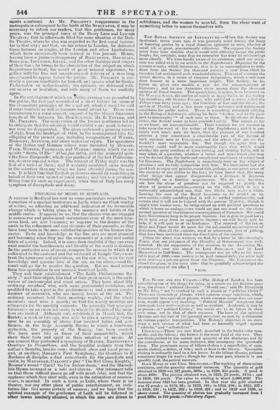THE ROYAL SOCIETY OF LITERATURE.—Wheli this Society was instituted, seven
years ago, it was generally cried down; the fancy
of fostering genius by a royal donation appeared to /Dell, whether of small wit or great, pre-eminently ridiculous. We suppose. the Society must have been sensible that it would with difficulty escape the public laugh ; for, certainly, none that we remember has done its ministerings more silently. IVe were hardly aware of its existence, until our atten-
tion was called to it by an article in the Englishman's Magazine for the present mouth; which informs us, that it is in contemplation to with- tion was called to it by an article in the Englishman's Magazine for the present mouth; which informs us, that it is in contemplation to with-
draw from the Society the thousand guineas a year from which its foenders had anticipated such wonderful effects. This act of economy the writer decries, in a strain of eloquent indignation, which would have done honour to a more important subject. The Society, he in- forms us, gives two medals a year for the encouragement of literature; and its ten Associates share among them the thousand guineas of Royal bounty. The medals have, ieseems, lieen bestowed on Sir Weeerea Seorr, the author of nearly as many books as time Society has members ; old GEORCiE Who published a poem culled the
Fillege some forty years ago; the historian of Lorenzo tire Great ; the author of 74e/elet, and a few more equally unknown and unlemoured
candidates for public notice. There is something cc tremely edifying in time Bishop of Salisbury's affixing his little " Elden seal to the pass- port to immortality "* of such men as these. In the choice oe Asso- ciates, the Society seems to have proceechsl safely. The names, as far
as we know, are unexceptionable. Their fortunes we nre, content to take upon the word of the writer of the Englishman ; and it is cer- tainly with much pain we learn, that the pittance of one hnndred • guineas a year constitutes a considerable part of the income of such eminent men as Coerenetse, and time others that are oil the
Society's most respectable list. But though we agree that no economy could well he more contemptible than that which Amnia abridge the petty comforts of these burning and shining lights, still it may admit of a question, whether a better and more direct plan may ' mu, be devised than the feeble and corn pH
anted machinery 1:f a m■yel fund ' fur literature. The Englishmen is exceedingly irate On the subject of pensions ; and we fully sympathize with him. We have never had the goad luck to enjoy any pension,—and this, perhaps, is one great cause of • • the sincerity of our dislike to the list ; we have heard that, like many other things that appear disagreeable at a distance, it improves • wonderfully on a familiar acquaintance. We do not, however, see how the abuse of pensions eau be supposed to justify the atone of pension societies,—except on the rule, which is net a universally acknowledged one, that two blacks may inzike a white. Leaving the case of the Royal Associates to be settled on its own merits, fully confiding that it will be settled satist-actorily, and certain that it will not be injured with the present Ministry, though it might with weaker men, by hieing mixed up with political questions to which it bears no analogy,—we would say- just one word on the often- mooted question of Government encouragement of literature. We would • have Government keep to its proper business. Let it give us good laws; let it take away from us oppressive imposts ; we will ft...Ay quit its . help, if it will quit ns of its hindrance. The removal of the tax on Rags and Paper would do more for the substantial encouragement of literature, than all time societies, royal or aristocratic, just or jobbing, that have been instituted since the foundation of the empire.
[Since the above was written-, we find, by a letter in this morning's Times, that our judgment of the 'liberality of Government was well. f.iunded. On the suppression of the pensions to the Associates, Mr. Coesiuncie's case was stated to Lord Buouterese and by Lord Bat:PVC:HAN to Earl GHEY. The conseqeence was an offer to the vene-
ralde poet of 209/.—one moiety to be paid immediately, the other half next year—as a private grant from the Treasury. Mr. Coe:nu:me de- chided time grant, at the s,uixe time that he gratefully acknowledged the prompt courtesy of the offer.] * Globe.


























 Previous page
Previous page